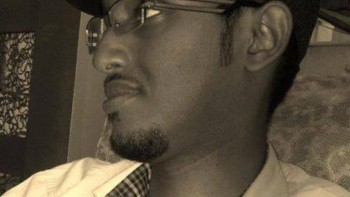Home » Saudi Arabia » Press Releases » KSA - News » Saudi Arabia: President of cultural association detained for promoting critical thinking
On 20 April 2013, Zakaria Ali, a Somali national, was arrested at Platinum Center, Salah Al Deen Al Ayubi in Riyadh by Saudi intelligence services (Al Mabahith) and taken to Riyadh Prison without any arrest warrant.
It is only after one month without any contact with the outside world that he was able to call his parents to tell them he was being detained by the intelligence services and was to be transferred to another prison in Jeddah.
He remains detained there to this date without having been charged or brought before a court five months since his arrest.
His parents have been able to visit him four times since his arrest but they are reportedly currently surveillance, so are Zakaria's friends who were contacted by Saudi official bodies and ordered not to interfere in his case.
As for his wife, Fatima Zahra Ali Sheikh, she was in Somalia visiting her parents at the time of his arrest. Due to administrative problems – specifically the Saudi system of male guardianship for women - she could not return to Saudi Arabia without the consent of her detained husband.
She told Alkarama: "I prefer to stay in Somalia and be free to contact human rights organisations. This way, I can do everything in my power to obtain my husband's freedom from there".
From Sakura to Djeddah – Behind bars for promoting critical thinking
Zakaria Mohamed Ali is the president of Sakura, an association which promotes reflection on social issues in Saudi society and cultural exchanges between Saudi Arabia and Japan, as he considers Japan to be a model of a developed social State that values its citizens.
He is also known for being a free-thinking intellectual and writer, promoting freedom for the Arab world's populations through free speech and critical thinking. In his writings, he expressed a critical view of Arab societies, which "undergo a lengthy education but do not have the one essential component of knowledge: critical thinking".
Zakaria Ali has expressed his opinion about the need for an open-minded interpretation of Islam and about the rights and freedoms of individuals many times. He is very critical and encourages others to be critical in their opinions and to avoiding accepting the mainstream discourse blindly.
"Zakaria Mohamed Ali has been detained for 5 months without any legal basis solely for having expressed his opinions freely. The arrest without a warrant and the detention by the Intelligence Services rather than regular security forces also leads us to think that he is a prisoner of conscience." said Alkarama's Legal Director Rachid Mesli.
"Zakaria's case is not unique. Arbitrary detentions and procedural rights violations in Saudi Arabia are systematic, as the UN Working Group on arbitrary detention has repeatedly set out in the past," added Mesli.
In a letter addressed to her husband, Fatima Zahra writes: "You have always told me that you feel that Saudi Arabia is your homeland, not just a country that you inhabit (...) I have no idea how you will define the very notion of homeland after all that has happened to you".
Today, Alkarama asked the UN Working Group on Arbitrary Detentions to intervene with the Saudi authorities in order for Mr Mohamed Ali to be brought promptly before a court, receive a fair trial or be released immediately in accordance with principles contained in the Universal Declaration of Human Rights and the Arab Charter for Human Rights.
 Algeria
Algeria Bahrain
Bahrain Djibouti
Djibouti Egypt
Egypt Iraq
Iraq Palestine/Israel
Palestine/Israel Jordan
Jordan Kuwait
Kuwait Lebanon
Lebanon Libya
Libya Mauritania
Mauritania Morocco
Morocco Oman
Oman Qatar
Qatar Saudi Arabia
Saudi Arabia Sudan
Sudan Syria
Syria Tunisia
Tunisia United Arab Emirates
United Arab Emirates Yemen
Yemen Other Countries
Other Countries


